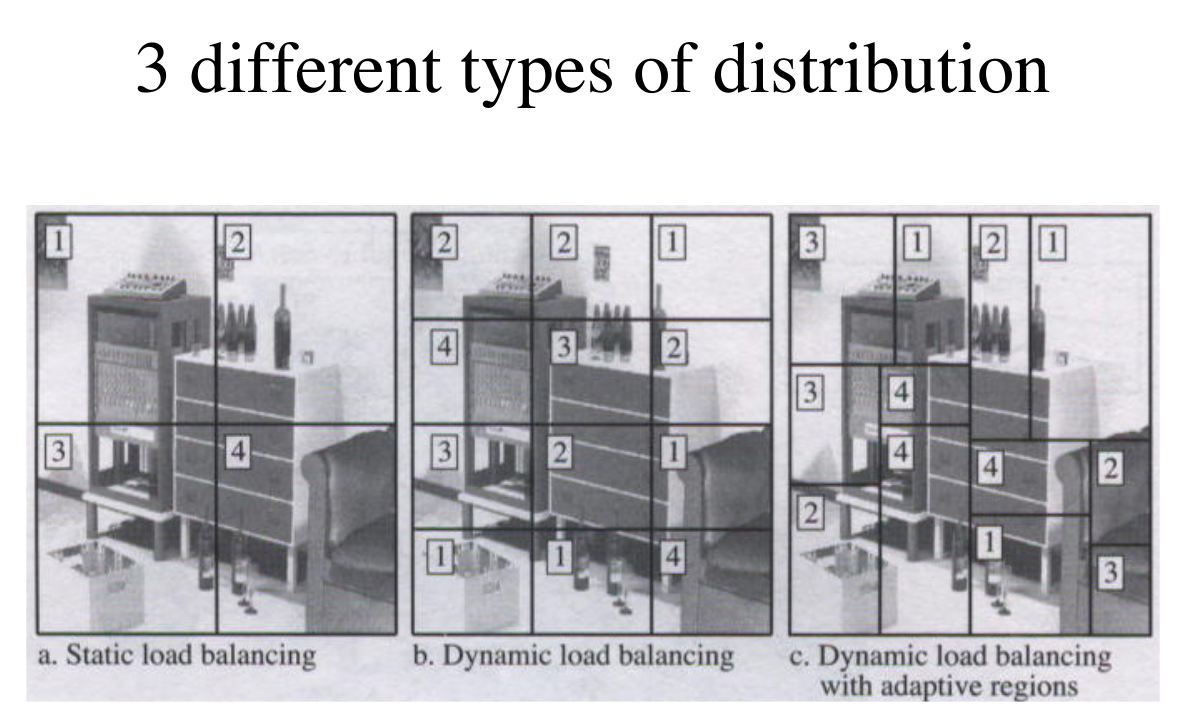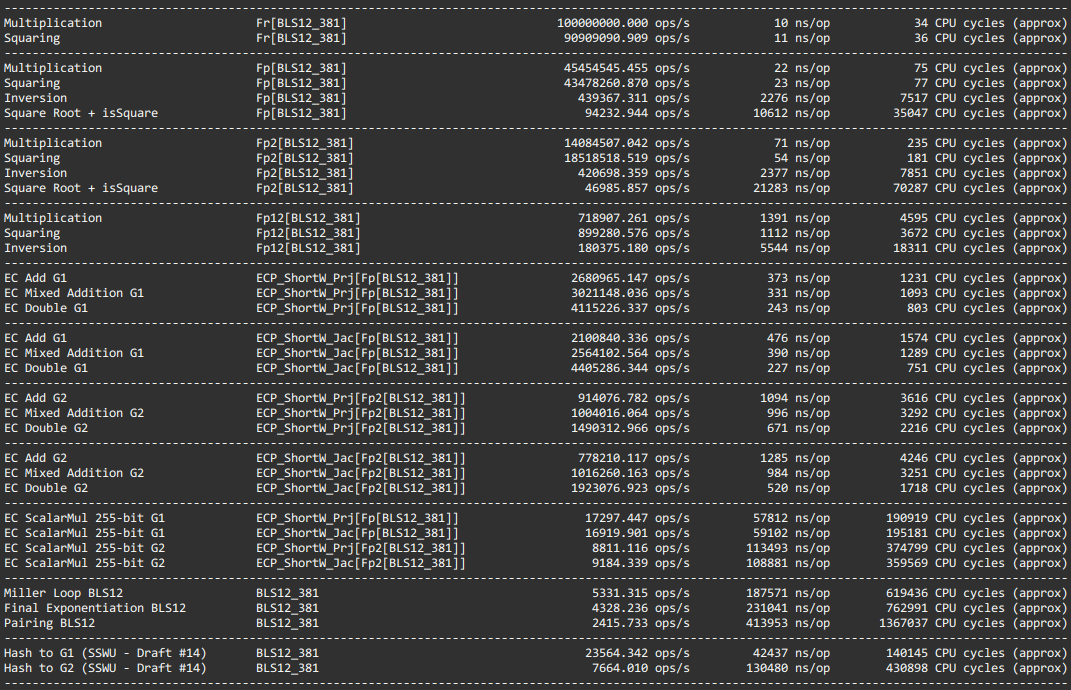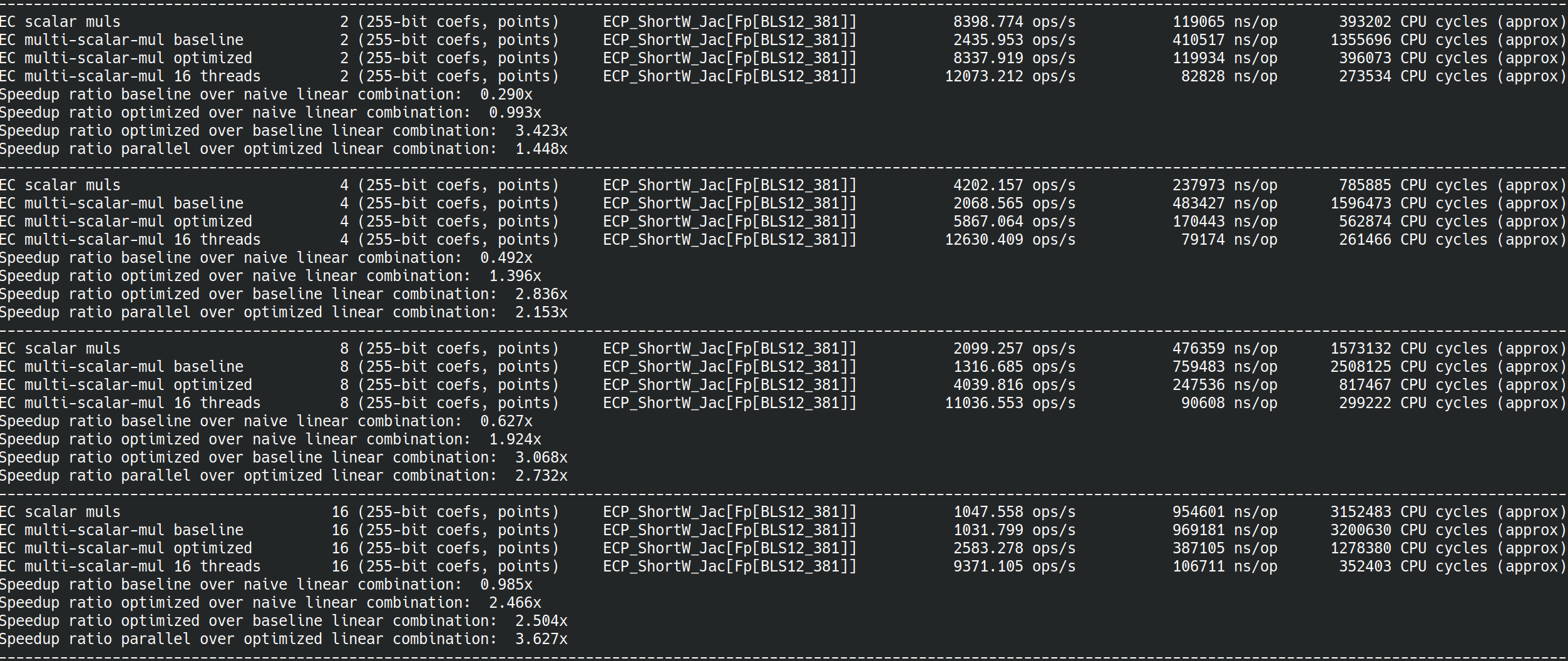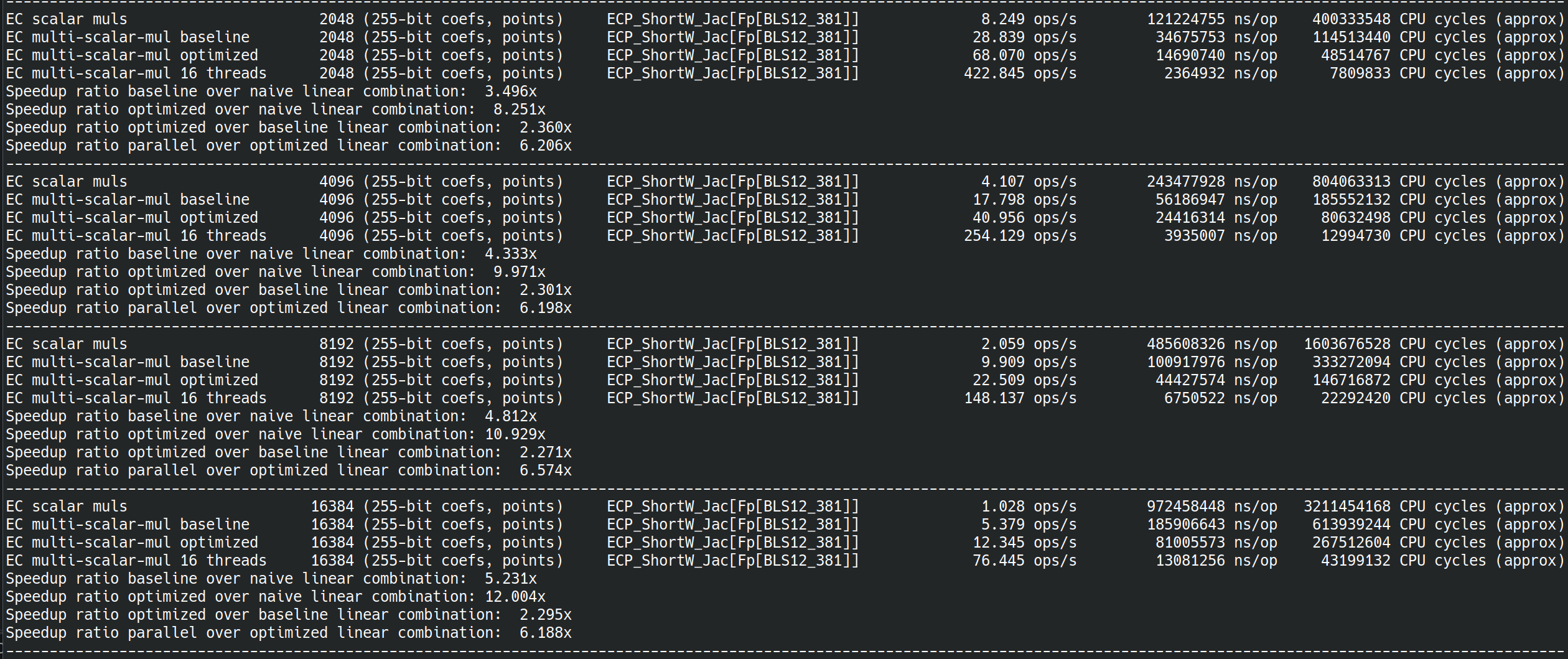“A cryptographic system should be secure even if everything about the system, except the key, is public knowledge.”
— Auguste Kerckhoffs
This library provides constant-time implementation of cryptographic protocols with a particular focus on pairing-based cryptography as used in blockchains and zero-knowledge protocols.
The implementations are accompanied with SAGE code used as reference implementation and test vectors generators before writing highly optimized routines implemented in the Nim language
The library is in development state and high-level wrappers or example protocols are work-in-progress.
- Constantine - Fast, compact, hardened Pairing-Based Cryptography
The library aims to be a fast, compact and hardened library for elliptic curve cryptography needs, in particular for blockchain protocols and zero-knowledge proofs system.
The library focuses on following properties:
- constant-time (not leaking secret data via side-channels)
- performance
- generated code size, datatype size and stack usage
in this order.
Protocols are a set of routines, designed for specific goals or a combination thereof:
- confidentiality: only the intended receiver of a message can read it
- authentication: the other party in the communication is the expected part
- integrity: the received message has not been tampered with
- non-repudiation: the sender of a message cannot repudiated it
Protocols to address these goals, (authenticated) encryption, signature, traitor-tracing, etc
are designed.
Note: some goals might be mutually exclusive, for example "plausible deniability" and "non-repudiation".
-
Install a C compiler, for example:
- Debian/Ubuntu
sudo apt update && sudo apt install build-essential - Archlinux
pacman -S base-devel
- Debian/Ubuntu
-
Install nim, it is available in most distros package manager for Linux and Homebrew for MacOS Windows binaries are on the official website: https://nim-lang.org/install_unix.html
- Debian/Ubuntu
sudo apt install nim - Archlinux
pacman -S nim
- Debian/Ubuntu
-
Compile the bindings.
- Recommended:
CC:clang nimble bindings - or
nimble bindings_no_asm
to compile without assembly (otherwise it autodetects support) - or with default compiler
nimble bindings
- Recommended:
-
Ensure bindings work
nimble test_bindings
-
Bindings location
- The bindings are put in
constantine/lib - The headers are in constantine/include for example Ethereum BLS signatures
- The bindings are put in
-
Read the examples in examples_c:
- Using the Ethereum BLS signatures bindings from C
- Testing Constantine BLS12-381 vs GMP ./examples_c/t_libctt_bls12_381.c
The bindings currently provided are:
-
Ethereum BLS signatures on BLS12-381 G2 Cryptographic suite:
BLS_SIG_BLS12381G2_XMD:SHA-256_SSWU_RO_POP_This scheme is also used in the following blockchains: Algorand, Chia, Dfinity, Filecoin, Tezos, Zcash. They may have their pubkeys on G1 and signatures on G2 like Ethereum or the other way around.
-
BLS12-381 arithmetic:
- field arithmetic
- on Fr (i.e. modulo the 255-bit curve order)
- on Fp (i.e. modulo the 381-bit prime modulus)
- on Fp2
- elliptic curve arithmetic:
- on elliptic curve over Fp (EC G1) with affine, jacobian and homogenous projective coordinates
- on elliptic curve over Fp2 (EC G2) with affine, jacobian and homogenous projective coordinates
- currently not exposed:
scalar multiplication, multi-scalar multiplications
pairings and multi-pairings
are implemented but not exposed - All operations are constant-time unless explicitly mentioned vartime
- field arithmetic
-
The Pasta curves: Pallas and Vesta
- field arithmetic
- on Fr (i.e. modulo the 255-bit curve order)
- on Fp (i.e. modulo the 255-bit prime modulus)
- elliptic curve arithmetic:
- on elliptic curve over Fp (EC G1) with affine, jacobian and homogenous projective coordinates
- currently not exposed:
scalar multiplication, multi-scalar multiplications
are implemented but not exposed - All operations are constant-time unless explicitly mentioned vartime
- field arithmetic
You can install the developement version of the library through nimble with the following command
nimble install https://github.com/mratsim/constantine@#master
For speed it is recommended to use Clang (see Compiler-caveats). In particular GCC generates inefficient add-with-carry code.
Constantine requires at least:
- GCC 7
Previous versions generated incorrect add-with-carry code. - Clang 14
On x86-64, inline assembly is used to workaround compilers having issues optimizing large integer arithmetic, and also ensure constant-time code.
Constantine uses the intel assembly syntax to address issues with the default AT&T syntax and constants propagated in Clang.
Clang 14 added support for-masm=intel.
On MacOS, Apple Clang does not support Intel assembly syntax, use Homebrew Clang instead or compile without assembly.
Note that Apple is discontinuing Intel CPU throughough their product line so this will impact only older model and Mac Pro
On Windows, Constantine is tested with MinGW. The Microsoft Visual C++ Compiler is not configured.
Constantine has no dependencies, even on Nim standard library except:
- for testing
- jsony for parsing json test vectors
- the Nim standard library for unittesting, formatting and datetime.
- GMP for testing against GMP
- for benchmarking
- The Nim standard libreary for timing and formatting
- for Nvidia GPU backend:
- the LLVM runtime ("dev" version with headers is not needed)
- the CUDA runtime ("dev" version with headers is not needed)
- at compile-time
- we need the std/macros library to generate Nim code.
The backend, unlike protocols, is not public. Here be dragons.
At the moment the following curves are implemented, adding a new curve only requires adding the prime modulus and its bitsize in constantine/config/curves.nim.
The following curves are configured:
- Pairing-Friendly curves
- BN254_Nogami
- BN254_Snarks (Zero-Knowledge Proofs, Snarks, Starks, Zcash, Ethereum 1)
- BLS12-377 (Zexe)
- BLS12-381 (Algorand, Chia Networks, Dfinity, Ethereum 2, Filecoin, Zcash Sapling)
- BW6-671 (Celo, EY Blockchain) (Pairings are WIP)
BLS12-377 is embedded in BW6-761 for one layer proof composition in zk-SNARKS.
- Embedded curves
- Jubjub, a curve embedded in BLS12-381 scalar field to be used in zk-SNARKS circuits.
- Bandersnatch, a more efficient curve embedded in BLS12-381 scalar field to be used in zk-SNARKS circuits.
- Other curves
- Edwards25519, used in ed25519 and X25519 from TLS 1.3 protocol and the Signal protocol.
With Ristretto, it can be used in bulletproofs. - The Pasta curves (Pallas and Vesta) for the Halo 2 proof system (Zcash).
- Edwards25519, used in ed25519 and X25519 from TLS 1.3 protocol and the Signal protocol.
Hardening an implementation against all existing and upcoming attack vectors is an extremely complex task. The library is provided as is, without any guarantees at least until:
- it gets audited
- formal proofs of correctness are produced
- formal verification of constant-time implementation is possible
Defense against common attack vectors are provided on a best effort basis. Do note that Constantine has no external package dependencies hence it is not vulnerable to supply chain attacks (unless they affect a compiler or the OS).
Attackers may go to great lengths to retrieve secret data including:
- Timing the time taken to multiply on an elliptic curve
- Analysing the power usage of embedded devices
- Detecting cache misses when using lookup tables
- Memory attacks like page-faults, allocators, memory retention attacks
This is would be incomplete without mentioning that the hardware, OS and compiler actively hinder you by:
- Hardware: sometimes not implementing multiplication in constant-time.
- OS: not providing a way to prevent memory paging to disk, core dumps, a debugger attaching to your process or a context switch (coroutines) leaking register data.
- Compiler: optimizing away your carefully crafted branchless code and leaking server secrets or optimizing away your secure erasure routine which is deemed "useless" because at the end of the function the data is not used anymore.
A growing number of attack vectors is being collected for your viewing pleasure at https://github.com/mratsim/constantine/wiki/Constant-time-arithmetics
Constantine's authors do their utmost to implement a secure cryptographic library in particular against remote attack vectors like timing attacks.
Please note that Constantine is provided as-is without guarantees. Use at your own risks.
Thorough evaluation of your threat model, the security of any cryptographic library you are considering, and the secrets you put in jeopardy is strongly advised before putting data at risk. The author would like to remind users that the best code can only mitigate but not protect against human failures which are the weakest link and largest backdoors to secrets exploited today.
TODO
High-performance is a sought out property. Note that security and side-channel resistance takes priority over performance.
New applications of elliptic curve cryptography like zero-knowledge proofs or proof-of-stake based blockchain protocols are bottlenecked by cryptography.
Ethereum 2 clients spent or use to spend anywhere between 30% to 99% of their processing time verifying the signatures of block validators on R&D testnets Assuming we want nodes to handle a thousand peers, if a cryptographic pairing takes 1ms, that represents 1s of cryptography per block to sign with a target block frequency of 1 every 6 seconds.
According to https://medium.com/loopring-protocol/zksnark-prover-optimizations-3e9a3e5578c0 a 16-core CPU can prove 20 transfers/second or 10 transactions/second. The previous implementation was 15x slower and one of the key optimizations was changing the elliptic curve cryptography backend. It had a direct implication on hardware cost and/or cloud computing resources required.
To measure the performance of Constantine
git clone https://github.com/mratsim/constantine
# Default compiler
nimble bench_fp
# Arithmetic
CC=clang nimble bench_fp # Using Clang + Assembly (recommended)
CC=clang nimble bench_fp2
CC=clang nimble bench_fp12
# Scalar multiplication and pairings
CC=clang nimble bench_ec_g1_scalar_mul
CC=clang nimble bench_ec_g2_scalar_mul
CC=clang nimble bench_pairing_bls12_381
# And per-curve summaries
CC=clang nimble bench_summary_bn254_nogami
CC=clang nimble bench_summary_bn254_snarks
CC=clang nimble bench_summary_bls12_377
CC=clang nimble bench_summary_bls12_381
# The Ethereum BLS signature protocol
CC=clang nimble bench_ethereum_bls_signatures
# Multi-scalar multiplication
CC=clang nimble bench_ec_g1_msm_bls12_381
CC=clang nimble bench_ec_g1_msm_bn256_snarks
The full list of benchmarks is available in the benchmarks folder.
As mentioned in the Compiler caveats section, GCC is up to 2x slower than Clang due to mishandling of carries and register usage.
On my machine i9-11980HK (8 cores 2.6GHz, turbo 5GHz), for Clang + Assembly, all being constant-time (including scalar multiplication, square root and inversion).
On a i9-9980XE (18 cores,watercooled, overclocked, 4.1GHz all core turbo)
Constantine multithreaded primitives are powered by a highly tuned threadpool and stress-tested for:
- scheduler overhead
- load balancing with extreme imbalance
- nested data parallelism
- contention
- speculative/conditional parallelism
and provides the following paradigms:
- Future-based task-parallelism
- Data parallelism (nestable and awaitable for loops)
- including arbitrary parallel reductions
- Dataflow parallelism / Stream parallelism / Graph Parallelism / Pipeline parallelism
- Structured Parallelism
The threadpool parallel-for loops use lazy loop splitting and are fully adaptative to the workload being scheduled, the threads in-flight load and the hardware speed unlike most (all?) runtime, see:
- OpenMP woes depending on hardware and workload: https://github.com/zy97140/omp-benchmark-for-pytorch
- Raytracing ideal runtime, adapt to pixel compute load:

Most (all?) production runtime use scheduling A (split on number of threads like GCC OpenMP) or B (eager splitting, unable to adapt to actual work like LLVM/Intel OpenMP or Intel TBB) while Constantine uses C.
The threadpool provides efficient backoff strategy to conserve power based on:
- eventcounts / futexes, for low overhead backoff
- log-log iterated backoff, a provably optimal backoff strategy used for wireless communication to minimize communication in parallel for-loops
The research papers on high performance multithreading available in Weave repo: https://github.com/mratsim/weave/tree/7682784/research.\ Note: The threadpool is not backed by Weave but by an inspired runtime that has been significantly simplified for ease of auditing. In particular it uses shared-memory based work-stealing instead of channel-based work-requesting for load balancing as distributed computing is not a target, ..., yet.
The Nim language offers the following benefits for cryptography:
- Compilation to machine code via C or C++ or alternatively compilation to Javascript. Easy FFI to those languages.
- Obscure embedded devices with proprietary C compilers can be targeted.
- WASM can be targeted.
- Performance reachable in C is reachable in Nim, easily.
- Rich type system: generics, dependent types, mutability-tracking and side-effect analysis, borrow-checking, compiler enforced distinct types (Miles != Meters, SecretBool != bool and SecretWord != uint64).
- Compile-time evaluation, including parsing hex string, converting them to BigInt or Finite Field elements and doing bigint operations.
- Assembly support either inline or
__attribute__((naked))or a simple{.compile: "myasm.S".}away - No GC if no GC-ed types are used (automatic memory management is set at the type level and optimized for latency/soft-realtime by default and can be totally deactivated).
- Procedural macros working directly on AST to
- create generic curve configuration,
- derive constants
- write a size-independent inline assembly code generator
- Upcoming proof system for formal verification via Z3 (DrNim, Correct-by-Construction RFC)
Unfortunately compilers and in particular GCC are not very good at optimizing big integers and/or cryptographic code even when using intrinsics like addcarry_u64.
Compilers with proper support of addcarry_u64 like Clang, MSVC and ICC
may generate code up to 20~25% faster than GCC.
This is explained by the GMP team: https://gmplib.org/manual/Assembly-Carry-Propagation.html and can be reproduced with the following C code.
See https://gcc.godbolt.org/z/2h768y
#include <stdint.h>
#include <x86intrin.h>
void add256(uint64_t a[4], uint64_t b[4]){
uint8_t carry = 0;
for (int i = 0; i < 4; ++i)
carry = _addcarry_u64(carry, a[i], b[i], &a[i]);
}
GCC
add256:
movq (%rsi), %rax
addq (%rdi), %rax
setc %dl
movq %rax, (%rdi)
movq 8(%rdi), %rax
addb $-1, %dl
adcq 8(%rsi), %rax
setc %dl
movq %rax, 8(%rdi)
movq 16(%rdi), %rax
addb $-1, %dl
adcq 16(%rsi), %rax
setc %dl
movq %rax, 16(%rdi)
movq 24(%rsi), %rax
addb $-1, %dl
adcq %rax, 24(%rdi)
ret
Clang
add256:
movq (%rsi), %rax
addq %rax, (%rdi)
movq 8(%rsi), %rax
adcq %rax, 8(%rdi)
movq 16(%rsi), %rax
adcq %rax, 16(%rdi)
movq 24(%rsi), %rax
adcq %rax, 24(%rdi)
retq
While using intrinsics significantly improve code readability, portability, auditability and maintainability, Constantine use inline assembly on x86-64 to ensure performance portability despite poor optimization (for GCC) and also to use dedicated large integer instructions MULX, ADCX, ADOX that compilers cannot generate.
The speed improvement on finite field arithmetic is up 60% with MULX, ADCX, ADOX on BLS12-381 (6 limbs).
Finally assembly is a requirement to ensure constant-time property and to avoid compilers turning careful branchless code into branches, see Fighting the compiler (wiki)
In summary, pure C/C++/Nim implies:
- a smart compiler might unravel the constant time bit manipulation and reintroduce branches.
- a significant performance cost with GCC (~50% slower than Clang).
- missed opportunities on recent CPUs that support MULX/ADCX/ADOX instructions (~60% faster than Clang).
- 2.4x perf ratio between using plain GCC vs GCC with inline assembly.
Thanks to 10x smaller key sizes for the same security level as RSA, elliptic curve cryptography is widely used on resource-constrained devices.
Constantine is actively optimize for code-size and stack usage. Constantine does not use heap allocation.
At the moment Constantine is optimized for 32-bit and 64-bit CPUs.
When performance and code size conflicts, a careful and informed default is chosen.
In the future, a compile-time flag that goes beyond the compiler -Os might be provided.
Licensed and distributed under either of
- MIT license: LICENSE-MIT or http://opensource.org/licenses/MIT
or
- Apache License, Version 2.0, (LICENSE-APACHEv2 or http://www.apache.org/licenses/LICENSE-2.0)
at your option. This file may not be copied, modified, or distributed except according to those terms.
This library has no external dependencies. In particular GMP is used only for testing and differential fuzzing and is not linked in the library.










